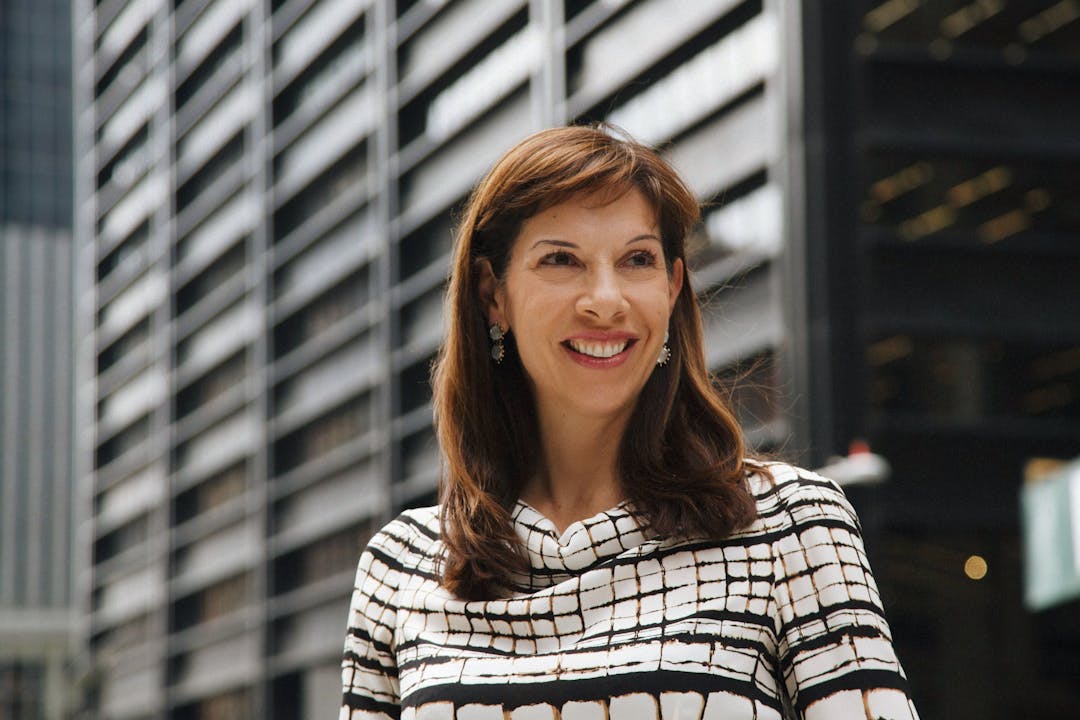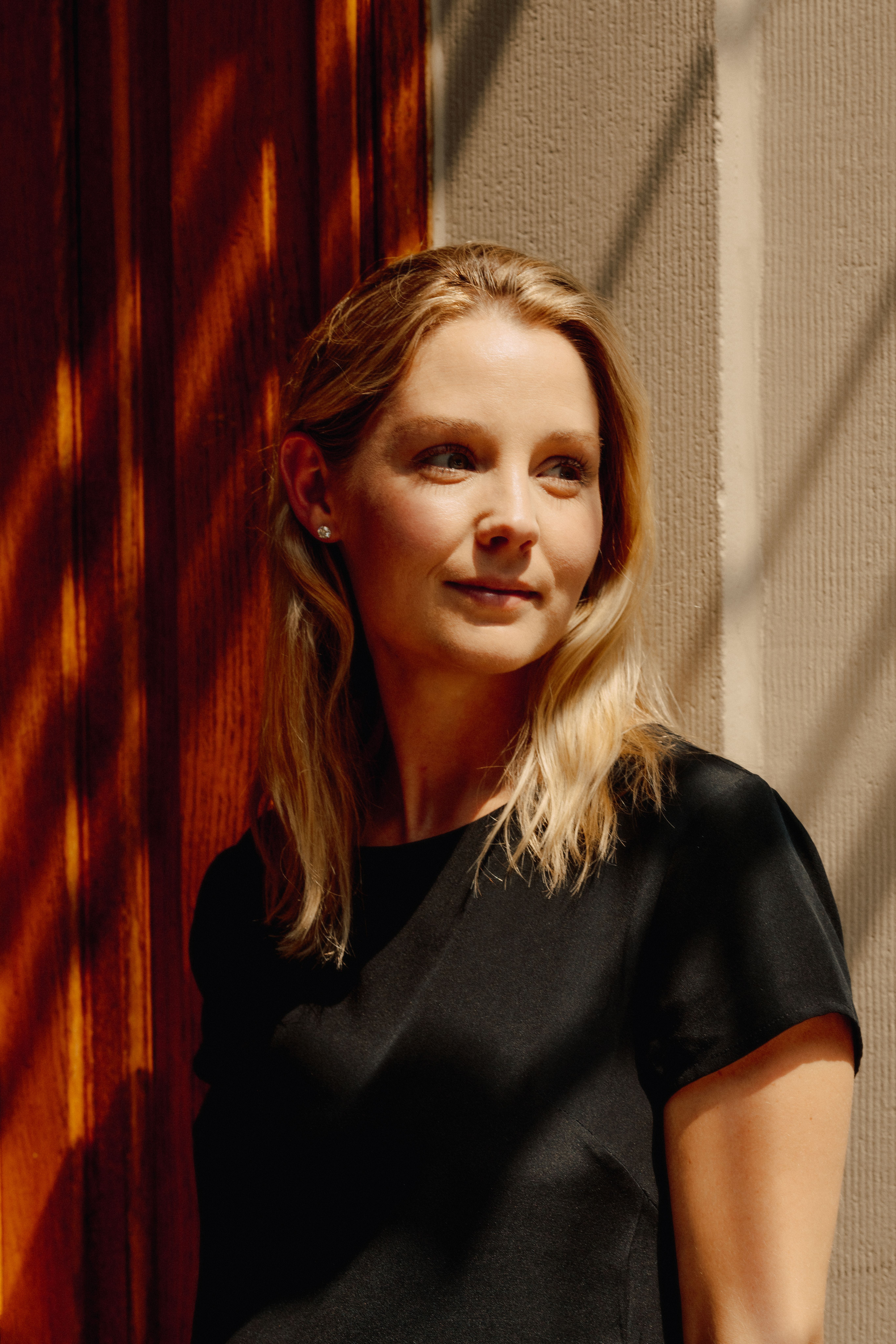
Christine Wendell
Dure Investment Group
Christine Wendell, Co-founder of Dure Investment Group and Pronto Housing, is on a mission to make affordable housing both more plentiful and more accessible amidst a historic, nationwide housing crisis.
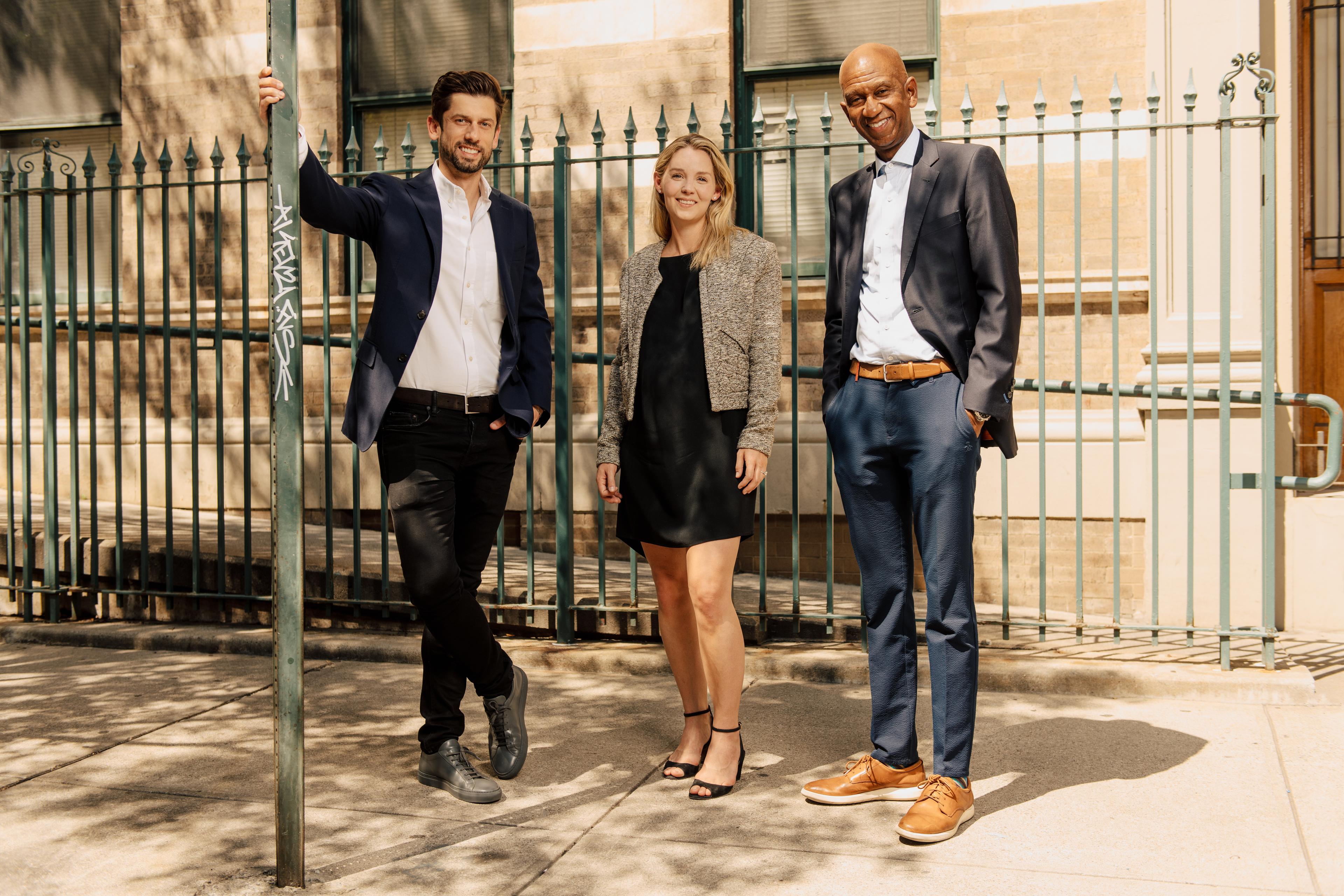
From left to right: Co-founders of Dure Investment Group, Rodrigo da Silva and Christine Wendell, with their project partner Jim Simmons, CEO and Founding Partner of Asland Capital
By Clark Hodgin for Commonplace
Can you briefly introduce yourself and the work that you do?
I'm Christine Wendell and I am the Co-founder of Dure Investment Group (DIG) and Pronto Housing.
DIG was born in partnership with Rodrigo da Silva, who is the Managing Principal and my co-founder. We worked together previously for a small developer here in New York called Megalith Capital, where he ran acquisitions and I ran asset management. At the end of 2019, the principals at Megalith decided to move away from investing in real estate; Rodrigo went with them for a while and that’s when I started Pronto. However, I still really wanted to continue to wear my investor hat, as I've been in asset management and investment or lending roles for my entire career, but in a way that is more aligned with Pronto, my values, and how I wanted to be spending my time. At the same time, Rodrigo also wanted to keep investing and we both wanted to be in a smaller firm, so it worked out for us to do something together.
Pronto Housing is a venture-backed SaaS company that was born out of my background in asset management, where I oversaw lease-ups of properties that had an affordable housing component. I was very frustrated by how opaque and time consuming the process was and felt like there had to be a better way to fill affordable housing units. So, at Pronto, we’re providing customers with software to get more people into affordable housing and get through the annual recertification process as quickly as possible. Our customers include property managers, owners, compliance consultants, sometimes municipalities – basically, anyone who interacts with people applying to affordable housing.
Can you share a bit about your background and upbringing?
I'm from the Bay Area and I've been in New York since 2017, but I did all of my education in the Midwest. My undergrad was at a tiny liberal arts school called Kenyon College where I studied English and economics.
For a little while I thought that maybe I wanted to be a lawyer or a writer; I was an English major with an emphasis in creative writing. But I always felt like the people who should be writers are people who can't help but to write – where it's something they are compelled to do. And I figured that it’s probably a lot harder to dabble in finance than it is to dabble in creative writing.
So, after graduating, I moved back to San Francisco for a while and worked for Wells Fargo, starting on the venture and lending side and eventually in commercial real estate. I went on to do business school at Kellogg at Northwestern, where I did my MBA before moving to New York.

By Clark Hodgin for Commonplace
How and why did you get into real estate and affordable housing, in particular? Was that something you were always interested in?
My family background is in real estate investing, so I grew up hearing about office deals, learning about things like how interest rates affect valuations, and going to construction sites. My dad's business was in value-add and, ultimately, core office and data centers in tech-focused markets, while my brother was a broker and my mom is a financial planner. However, suburban office is not what I find to be the most exciting, even though it worked well for both my dad and my brother.
For me, my love of real estate is really about the impact that it can have, which I think stemmed from the understanding of the process and exposure to dealmaking that I got from my family – I still remember my dad's deals, where he was like, “I built that public park so that I could build this building higher.” Those experiences taught me early on that real estate matters a lot and that the built environment shapes our society. What you choose to build, who you’re building those places for, and who you “allow” in those places sends really different messages to a neighborhood and the people in them – and I say “allow” in quotes because they’re not always hard barriers, but pricing and product type creates natural barriers to access. It’s definitely something that became personally important to me over time.
As my career progressed and I worked for different developers, I saw how different projects shape environments differently and how oftentimes when people think of development, they immediately think of gentrification; the reaction is kind of visceral. However, in addressing housing affordability you’re dealing with basic supply and demand: we need to add units to alleviate the overwhelming demand for housing.
"It can be challenging being creative with how you're capitalizing deals and making returns work with reduced rents; and, obviously, there's a ton of work to be done to create enough supply to reach an equilibrium. But looking at the whole picture of what is economically feasible, I think affordable housing is still the way to make the biggest immediate difference."
What was your career path and how has that led you to where you are today?
My first job out of college was with Wells Fargo in their general commercial banking group, which included the venture and technology lending group in Palo Alto where I'm from. From there, I moved over to the real estate lending group, which covered all types of real estate, including multifamily, office, industrial, hotel, etc. Over time, I decided that I wanted to move over to the principal side, so I went to business school at Kellogg.
While at Kellogg, I did a whole bunch of internships – a small developer in San Francisco, Beacon Capital, Och-Ziff (now Sculptor Capital) – before landing at RXR full time in their development and asset management group. There, I was focused on ground-up multifamily development in the greater New York area, which usually included an affordable housing component. And I went on to run asset management at Megalith Capital, where I also oversaw lease ups of affordable housing units.
Then, 2019 was a pivotal year for me. The principals at Megalith decided to move away from real estate, so I lost my job. I also got married that year. And my dad very unexpectedly passed away. Those things really culminated with me reflecting a lot – as I think a lot of other people did during COVID – on how I was spending my time, what difference I wanted to make, and what difference I was uniquely positioned to make; or perhaps was simply more willing to work toward, regardless of skill. I stepped back and took a few months to decide, “What do I want to do with my time on this earth?”
Ultimately, this led me to first starting Pronto, and then eventually starting DIG with Rodrigo as well.

Rodrigo da Silva, Co-founder & Managing Principal of Dure Investment Group
By Clark Hodgin for Commonplace
Can you give me an overview of Pronto Housing and its mission? What is the goal of the product you are developing?
Pronto’s mission is to help our customers “spend time on life, not paperwork” by making resident qualification efficient, easy, and fast. To give you some context, when someone applies to affordable housing or renews their lease, they go through an annual certification process to verify their income, assets, household composition, and sometimes some other preference groups. It's a very thorough process where you’re collecting six months of pay stubs, six bank statements, and a ton of other information to verify eligibility.
On the resident side, we have a software platform that makes it easy for the resident. It's mobile compatible and people can submit documents through text and email if they want. There's also a helper feature, so someone could loop in an adult child or a caseworker if they need assistance. We’re meeting the resident where they're at, so that they don't have to come in person and can do it on their own time. It makes it really easy for them.
On the property side, we’re addressing several things. The traditional process is manual and slow; a lot of it is literally pen and paper and scanning documents, so digitizing the document is one low hanging fruit. The other piece is workflow. Traditionally, compliance people work on the close to 30 files they need one at a time and it's just not efficient. In Pronto’s dashboard, there are tools to batch and streamline that work. Instead of one document at a time, people can send all of their reminders, or all of their e-signature requests in one batch. They don’t need to manually track and communicate about each item; they just press a button and the email populates. And finally, for lease ups in particular, if someone is not going to qualify, you want to spend as little of your time and, frankly, of their time as possible to determine that. So we have configured questionnaires to optimize for that.
The platform was also built to be configurable for any affordable housing program, so when someone sets up a property in our system, they can add the forms that are specific to that regulatory agency and then tweak it to meet the needs of their specific property. That’s really important because the average project has four and a half different types of subsidy – it's pretty common to see more – and each usually has different compliance requirements. By building that kind of flexibility into our platform, we’ve been able to grow our national presence to about 11 states now and we’ll be looking to grow that quickly in the coming years.
All of these things help make it so that property managers can fill units faster and reduce staffing time for the annual process, which allows people to be more productive and focus on other things.

Courtesy of Asland Capital Partners
Turning to the investment side now, can you give me an overview of Dure Investment Group and its mission?
Sure. Dure is an impact-oriented investment firm focused on affordable housing in the greater New York area. We have $20 million that we’re still deploying, with both a value-add mandate and a core mandate that allows us to work with partners wherever we can. That’s important because many of the regulatory requirements that go with affordable housing subsidies restrict what the capital stack can look like and how it is structured.
Our flexibility allows us to structure our capital in a creative way to make sure we get the return that we need, while also meeting the needs of the deal. And it’s especially valuable today, when a lot of deals have a gap in their capital stack and can’t qualify for debt with their allocated equity due to where interest rates are. People appreciate that we can step in where others can’t or won’t and they seem to like working with us, so it’s going well so far.
We've done three deals to date, which were a loan participation, a private equity deal, and a co-GP deal. We specifically started with partnerships to build our track record and get the operating partner right; operating a deal takes a lot of time and we don't have that much capacity being just two people, so we like working with GP partners for now. The other benefit of that is that we can rely on the diligence of the institutional investor on these deals; we're not a high maintenance investor, but we still get a pretty thorough underwriting because someone with a lot more money in that deal is demanding it.
However, the next stage of our business will be about building up the capacity to take down our own deals. We'll do asset management and ultimately bring in outside capital, so we’ll definitely be looking to fundraise for new projects and also potentially to recapitalize some of our existing investments as we grow beyond our first fund.
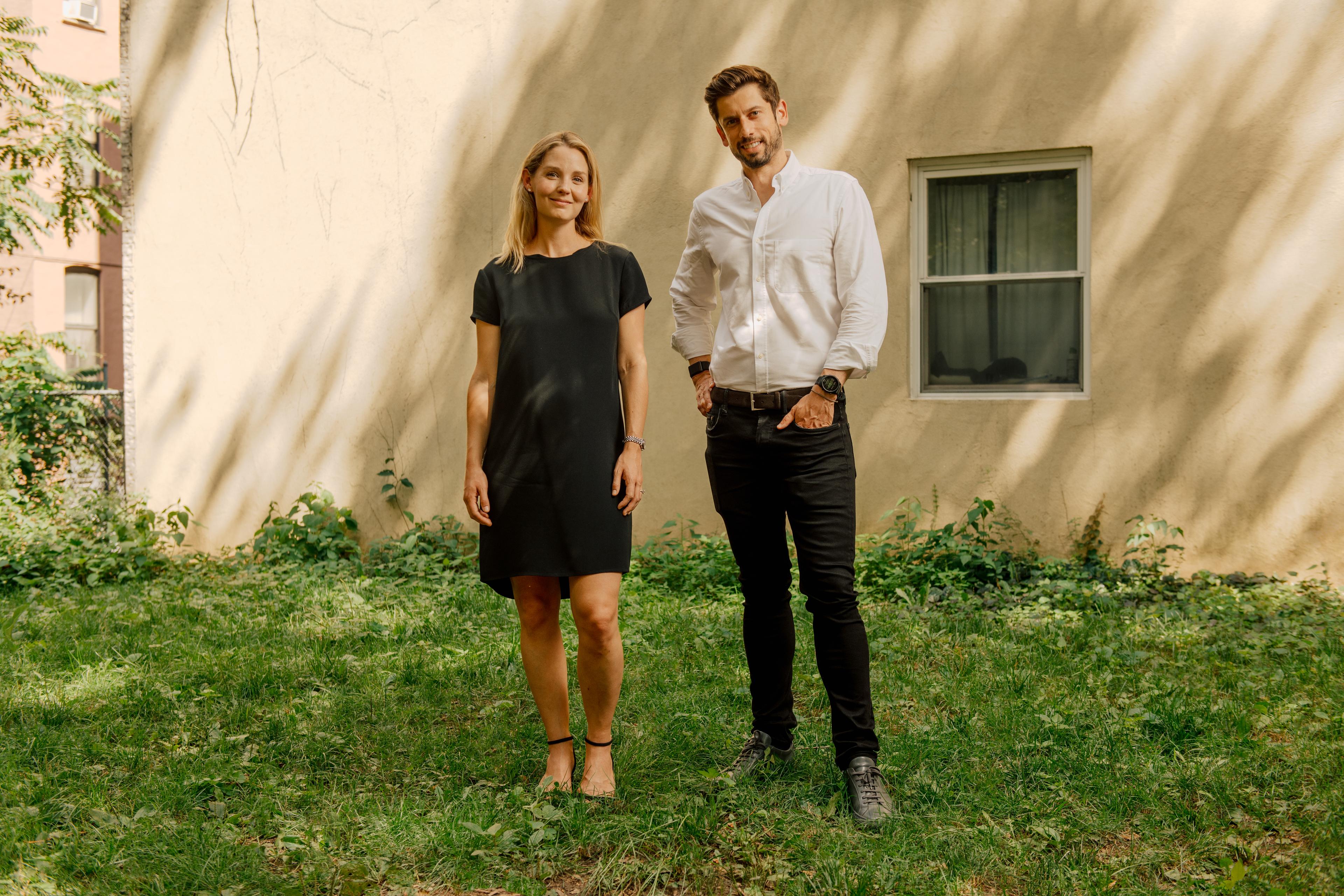
By Clark Hodgin for Commonplace
What criteria does Dure use to evaluate potential projects?
The first thing is simply the return we want: a risk-reward profile that we find to be appetizing, which can be challenging, especially when interest rates were going up a year ago and the market hadn't adjusted yet. There were a lot of sellers asking for crazy prices and we just said absolutely not, so that froze us for a bit, but we’re starting to see more good opportunities now.
And the other main criteria is maintaining affordability. We need the deal to work with a structure in place for an affordable housing component or for the deal to have a plan in place, ideally with a regulatory agreement, to re-up affordability following near-term affordability expiration, like in cases where the LIHTC compliance period may be coming to a close. Usually this will mean big-A affordable, but I would say we are also open to other types of affordability. For example, Fannie Mae has a program called Sponsor-initiated Affordability (SIA) where you maintain rents at 80% AMI or less, so I would still put that in the affordable bucket.
Taken together, the project needs to have cash flows that get you to a yield that works for the capital, even with affordability requirements in place. A lot of deals use vouchers and other subsidies to supplement below-market rental income or have reduced operating expenses through tax abatements, allowing you to subsidize the equity in a variety of ways. However, if you don't have that, you can end up in a very tricky situation where your yield is just getting squished and we can't do those deals.
Besides financial returns, are there other results you are looking to achieve through your investments?
We’re primarily concerned with housing affordability, but I will say that overall you’ll find more diverse founders and principals in affordable housing than in other types of real estate and that those principals are often motivated by a variety of different things. Coming from the commercial side in New York, I worked predominantly with white or Jewish men my whole career on investments that were mainly focused on returns. There’s absolutely nothing wrong with either of those things, but it is sort of what makes affordable housing very interesting, relatively speaking. You’ll find more people of color, more women, more people with different experiences and I think that can make deals very interesting; some people may mainly be looking for return on capital, but others may be strictly focused on serving people with justice-impacted backgrounds, for example.
I love working with partners who are passionate about those different groups and causes and exploring different ways that we can work together. At this point in our company development, we just sort of have a large umbrella around affordable housing, but I think that as we evolve, maybe we'll develop specific areas of interest that we’ll want to focus on. For now, we’re just seeing who we come across as partners, where their passions are, and what structure can be built around those areas.
Are there any specific geographic requirements for your investments?
So far we are only in the New York area just because that's the market that we know best and it's where we're based. That said, as our network grows and we find partners that we trust who have niche expertise, we would be more than happy to consider other markets. For example, we know someone who is focused on Charleston, South Carolina and we're building that relationship so that if she were to bring us a deal, then that would be something that we would look at, even though it's pretty far out of our core competency.
One thing I would say is that these other markets have to be core urban centers. A key feature of affordable housing is that rents are usually linked to AMI, the area median income, and you just see more AMI appreciation and general stability in markets with a critical mass of population.
Are there any background and/or track record requirements for your investments?
No, actually – at least not a hard no. Experience counts; you don’t want someone who has been in chemistry their career and now they need your capital to do affordable housing. That said, I think that in affordable housing, because the regulatory agreement is so critical, the most important thing is actually the relationship. And that sort of boils down into two things.
The first is, simply, is this person trustworthy? And importantly, there's what the documents say and then there's how someone is actually going to behave. The docs are there to give you guardrails and legal protection, but if someone really wants to screw you, then that's just not someone you want to be in business with, right? Even if you’re protected legally, you still want someone who will try to do the right thing, regardless of what the docs say. So, for example, Jim Simmons is a partner of ours and he is very trustworthy; people have good things to say about him and he has a great reputation.
The other thing is, can they execute? This is more where experience comes into play. My perspective is that the difference between someone who executes versus someone who doesn't is really cost management and the willingness to get things done and put in time to figure things out. Some of that comes with experience, some from relationships, and some from just the type of person that they are.
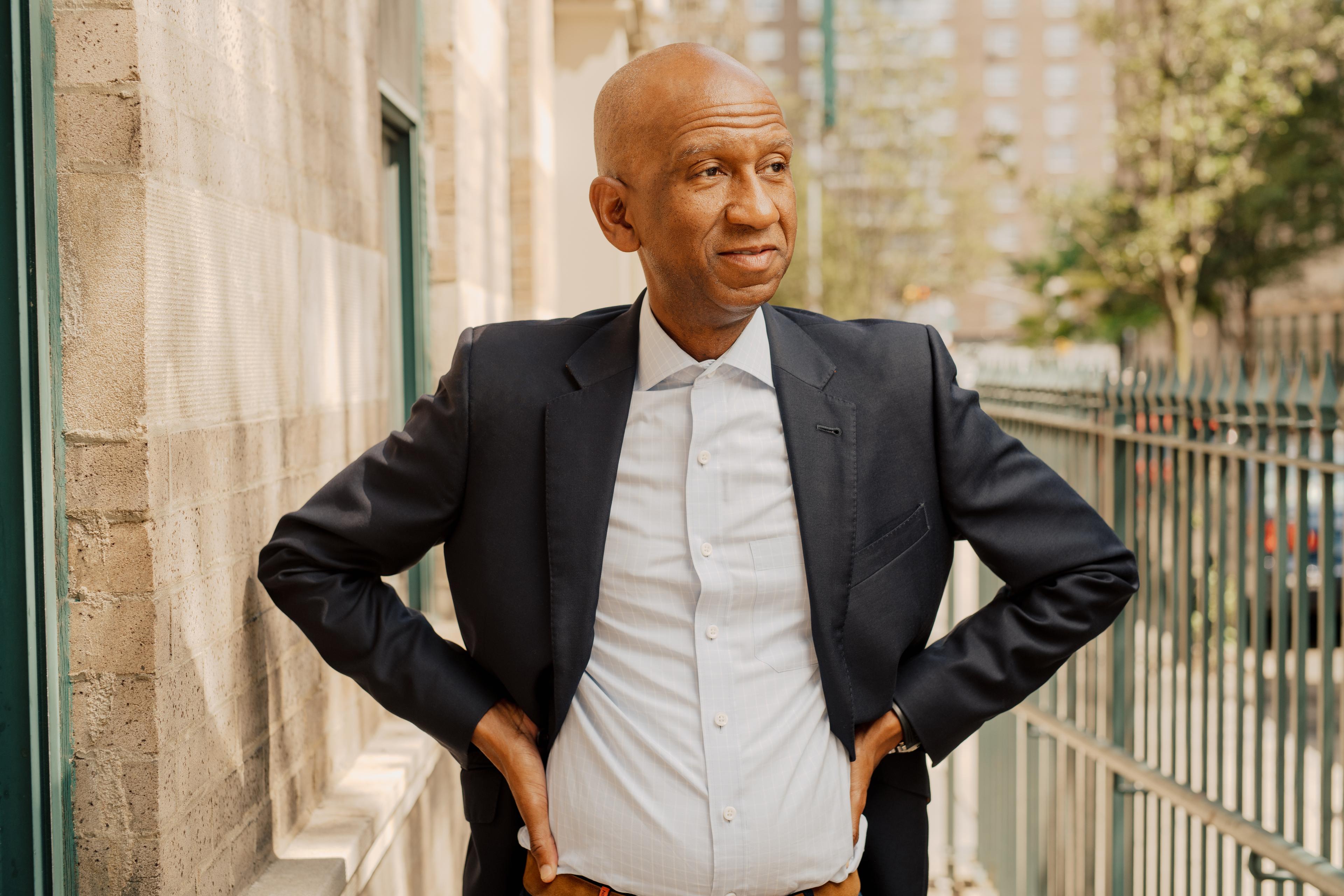
James Simmons, CEO & Founding Partner of Asland Capital Partners
By Clark Hodgin for Commonplace
Is there a minimum or maximum size in terms of both project development costs and your capital commitment?
I would say $1 million to $5 million is the sweet spot for our capital. And there are no limitations on project size on our side, but, from a partner’s perspective, if they have a billion dollar capitalization and we’re looking to write a $5 million check, we’re probably not worth their time.
Can you give an example of a project that you have funded to date?
We recently closed on a deal with Asland Capital Partners and Jim Simmons, who is the principal there. We met originally because he's also a Kellogg alum and there are very few alumni in New York that are also focused on affordable housing – it's pretty niche. Asland made an angel investment into Pronto and that's how we first got acquainted.
The Asland deal is a portfolio in Harlem and it’s a value-add affordable housing deal. It’s also the anchor deal for another fund where Goldman Sachs’ Urban Investment Group is providing the LP capital. So this was a really exciting way for us to start working with them as they're starting this new vehicle. And the deal itself has great downside protection because it's a stabilized deal with some development potential for upside as well.

Dure has invested in a portfolio of affordable housing properties spread throughout Harlem
Courtesy of Asland Capital Partners

Are there any tips or best practices you could share with folks who would like to seek out your capital? What should people know before starting a conversation with you?
I would say to have a thesis. People have limited time, so when people are looking for capital and they come with just a general desire to invest in real estate or something else that’s really broad – that's not very compelling.
The other thing is to be network-oriented. I know that that is perhaps ironic to say on this platform, since one of the biggest challenges is often access to networks, but I think you have to invest in your relationships. You don't need to know someone well to ask them for an introduction; I've asked people who I've met just once, or maybe just talked to for five minutes at a conference, to introduce me to other people they're connected to. The worst that can happen is they say no – no big deal. But the network effect is very strong simply because, as I mentioned, people have limited time. They're a lot more willing to take a call with someone who they have a common connection with, or at least some frame of reference for why that person is reaching out besides, “Hi, I'm a stranger who wants your time and money.”

By Clark Hodgin for Commonplace
What drives you and motivates you to do what you do?
I think that each of us only has a certain amount of time and we don't know how much time that is. And, reflecting on how I could best spend that time, one of the things that really drives me is that I can make housing more attainable in a society where we really have not done enough to make it affordable and accessible. So with Pronto, for example, that means drastically reducing the time spent filling out paperwork, making it so that someone can more easily have a stable place to live and a better quality of life.
Right now in the vast majority of markets, someone who is making minimum wage, or even a middle class wage in some cases, cannot afford housing. There are ways to address and subsidize that, which is really what the affordable housing market is all about, but the existing programs and what’s been done so far is not enough. We all need to be working to provide more housing because the gap between what is needed and where the housing market is today is quite significant.
"I really do believe that housing is the foundation from which someone can contribute to society. It's really hard to think about questions like, 'Am I artistic?', 'Am I interested in science?', 'Am I spending enough time with my kid?' – all those things that really make a life full and fulfilling – if you don't have stable housing."

By Clark Hodgin for Commonplace
What are your thoughts about the tension between financial returns and social impact? Are these mutually exclusive?
I say absolutely not. You can have both and you should have both. And I think that if you can't have both, then you won't solve the problem in a scalable way.
To add to that, I think that mindset is becoming more common now and you can see that reflected in the increasing amount of institutional capital going into affordable housing. Tishman Speyer has an affordable housing fund. Blackstone purchased April Housing from AIG and they are now one of the largest affordable housing owners in the country. Starwood Capital and Related have always had an affordable housing component to their portfolios. And you also have a lot of real estate private equity funds that are more focused on workforce housing and self-imposed affordability, which meets a separate need for affordability in the market. And among the investors in those funds or institutions, many are now looking for a double bottom line.
But that cuts both ways, too. Concessionary or non-profit investors also face the challenges of inflation impacting their operating expenses and returns. They still need to operate in a way that is nimble and creative because, although they can accept higher costs from their services and lower returns on investment, they still can’t be underwater, otherwise they won’t survive.
I've seen situations where non-profits have had to sell their whole portfolios and go under because they're not operating in a way that is sustainable.
"I think fundamentally you still always need to focus on financial returns to, at the very least, get a sustainable investment. But if you add those impact goals on top of that, then that’s how you get projects that are truly impactful and will remain impactful over time."
What is the role of government and policy in making the kind of impact you’re envisioning possible?
I think the government has a responsibility to house people and by extension to create or provide solutions that allow more people to be able to afford their rents. For example, the minimum wage is set by the government and obviously if wages are increased, then rents will not be as much of a burden. However, as we all know, that has not increased in over a decade, so if the government is not going to increase wages, then it has to look at other ways to make rent or other costs of living lower. Either way, it’s clear that the government has many different levers in its toolkit that allow it to attack the issue from many different angles.
The easiest one, frankly, is real estate taxes. They’re set at the local level. They have a massive impact on the operating expenses of a building. And for the government, the expense is in the non-collection of taxes, as opposed to coming out of pocket like they would with a voucher or other rental subsidy program. That said, while I think that that's the easiest approach, there is still a lot of politics behind that and not everyone may be supportive.
"One thing I'll add is that when people contemplate and debate over costs of public benefits like affordable housing subsidies or tax abatements, oftentimes they're not weighing in the costs of not housing everybody. For some reason, it's just not in the equation. There’s a cost to housing someone, but there’s also a cost to leaving them on the street. For example, they might need mental health services or they may commit a crime and end up in prison. All of those outcomes are real costs that we all bear and they’re a direct consequence of us not taking care of our citizens."
Looking ahead, what are the near and long term outlooks for your businesses? Are there any challenges you foresee on the horizon? How will you face these?
I would say funding is always a challenge and that applies to affordable housing as a whole. We have a massive shortage of affordable housing, despite the many programs that already exist, and it will only get worse as there are a lot of regulated properties that are close to the end of their compliance periods. New programs are being introduced, but not nearly enough, so funding will remain a big challenge.
At DIG, we're still in the early stage, so our next stage will be our growing pains stage. We’ll be shifting from being a partner to being a solo GP and I'm sure that raising a fund and getting to that next stage of company development will be challenging; fundraising, finding deals, scaling, and even just finding the next hire – all of those things are not easy.
With Pronto, the venture capital market is not exactly sunshine and roses these days, so the big challenge there is to figure out the right capital partner for our next stage of growth as we scale above $1 million of SaaS ARR* and above $3 million of total revenue. We’ll need to figure out a way to grow in a way that allows us to remain true to our core values.
* ARR stands for annual recurring revenue, which is a key metric for subscription-based companies.

By Clark Hodgin for Commonplace
As you reflect on your career and company, what are some things you wish you knew when you first started?
I would say the biggest thing is that whenever you're stressed out, try to think if it's going to matter in a week, a year, or five years from now. There were definitely a lot of quarterly asset management reports where I was really stressed out about getting it done. And yes, I had to get it done, but I honestly didn't need to be so worried about it; you just put in the time, finish, and move on.
The other thing I’d mention is that you should shape the life that you want and that works best for you. At Pronto and at DIG, we have a culture where if someone wants to leave at four to pick up their kid, or if someone wants to work on Sundays rather than Fridays, they can definitely do that and it's fine. Work is just one aspect of life and everyone is juggling many different things, so you shouldn’t feel the need to explain yourself or provide excuses. It’s better to be direct and say, “Hey, I need to leave at two today.” As long as you're someone who gets your work done and has built up relationships such that people know they can rely on you, then I think you probably have a lot more leeway than you think you do. And if you don't and you’re at a company that’s really rigid, you can put yourself into a position where you do have that flexibility. You decide if something works for you or not.
And I think the common thread there is that I was just very stressed about a lot of things earlier in my career that, in retrospect, I really didn’t need to be.
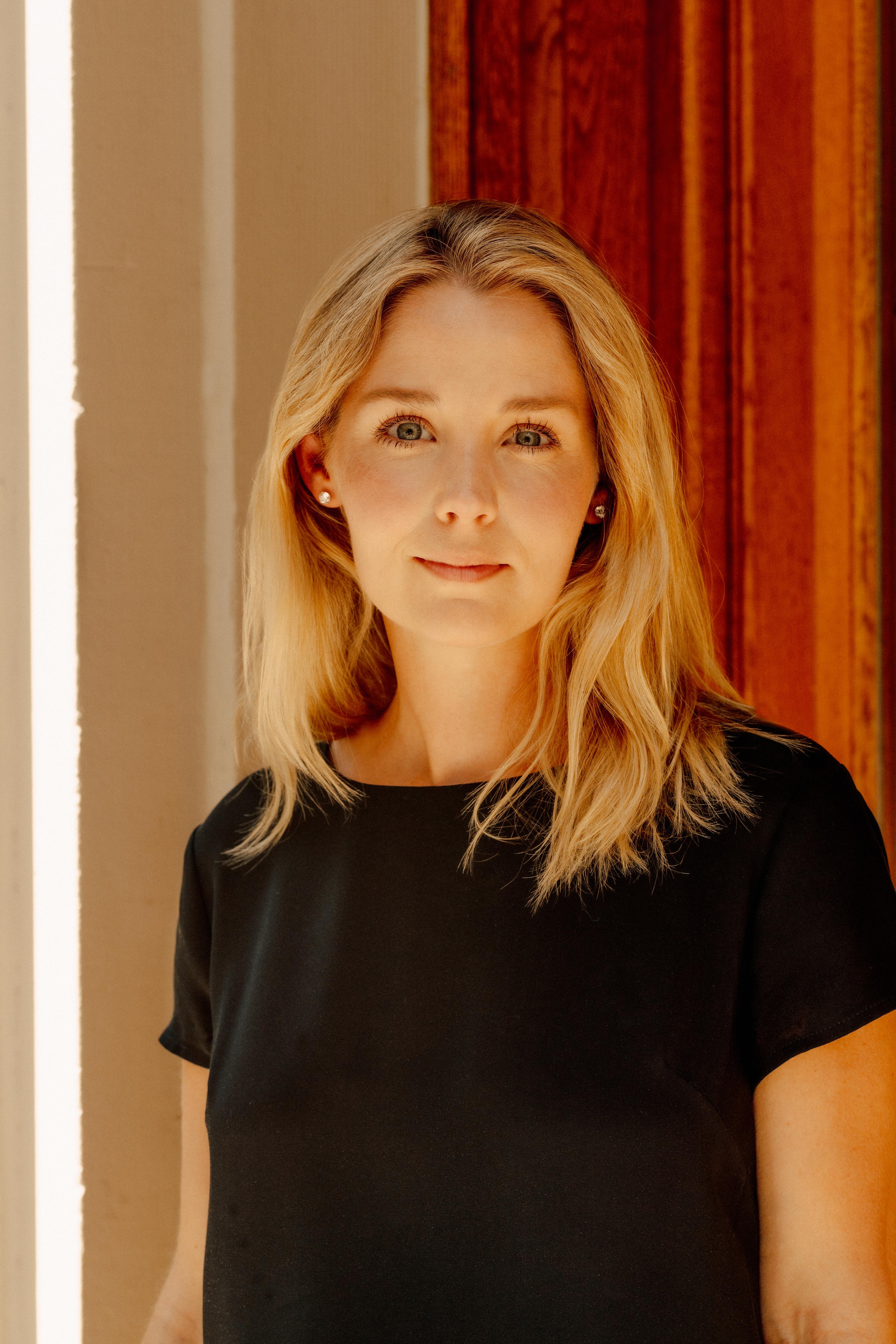
By Clark Hodgin for Commonplace
Somewhat related to that subject, are there any tips or best practices you would share with folks who are looking to build their career in this space? And is there any advice you’d offer specifically to women building their careers in male-dominated fields?
I think that it is helpful early in your career to have some structure. I went through the Wells Fargo Financial Analyst Training Program, where I learned and worked alongside a whole class of analysts. It taught me how to be a working person – you know, give myself to-do lists, show up on time, and all of that other basic stuff. It might be basic, but you don't show up on this earth knowing how to do those things. That structure and those core skills – in real estate, I would specify analytical skills, like financial modeling or regulatory and legal literacy – will be the foundation for the rest of your career, so it’s best to build them early on.
The other piece of advice I’d give – and I’ve mentioned this already, but I think it bears repeating – is to network and network extensively. When I was in business school, I had a spreadsheet where I kept track of everyone I'd met and actually it has kind of come full circle. I recently reconnected with someone who I had originally met back in 2017 and is now in a very senior role at Blackstone. We hadn’t really stayed in touch and he didn’t remember me, but it was still nice to have that touch point. I was able to refer back to where he was in his life back when he was transitioning into a new role and it was a warm way to start that conversation, as opposed to a cold outreach.
As far as advice for women in this field, honestly, I would just say don't take shit from anyone. I think that a lot of women, but also a lot of people in general, look for someone else to give them permission to make bold choices, go after that job or deal, or start their own thing. And one of the best pieces of advice that I ever got was that no one is going to look out for you, except for you – a little harsh, but that thinking has really allowed me to actively shape my career and my life. For example, when someone tells me no for a deal, for capital, or, really, for anything else, it's not a sob story for me. It’s totally fine; I’ve got more people to talk to. I can move on to the next conversation and continue getting the things I want and need done.
What legacy do you hope to leave?
I would want people to say that I was unafraid to live authentically and be true to myself and that I got things done. It sounds silly, but I do really feel that a lot of people are held back because they're afraid to just do. And I think that I don't always do things perfectly or communicate in the smoothest way, but I am very action-oriented.
Who has inspired you over the course of your career? Who has helped you along the way?
I know this is a little cheesy, but I would say my dad was definitely my biggest inspiration. He not only started his own company and built that from the ground up, but he was also someone who lived in a way that was free and he didn’t care what other people thought of him. For example, if he were out in public and felt sore or wanted to stretch, he would do yoga right there, like at the airport. Or he would do things like take a work call while on the elliptical. I remember when I first started drinking wine, I didn't really like it because I hadn't tried it before and so I only liked dessert wine. My dad would open up a bottle of dessert wine for dinner because he was just like, “Why not? If you like it, great – you only live once.” So I would say that he has been one of my biggest inspirations for who I want to be and how I want to live my life.
I was also lucky to have some great bosses earlier on, like Nicole Sermier, who was a principal at Och-Ziff Capital Management, now known as Sculptor, and has been a really great mentor to me as well over the years.
And then I would just say my two co-founders, Rodrigo at DIG and KC at Pronto. I really admire what they bring to the table for both of our respective companies, of course, but I also appreciate that we have very honest relationships where we can get into it about a deal or about a project, but there are never any hard feelings afterwards.

Christine Wendell
Dure Investment Group
